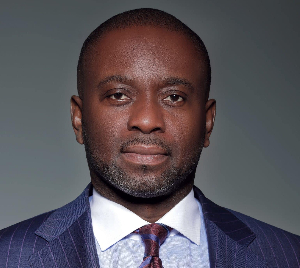 Edward Nana Yaw Koranteng, CEO of Minerals Income and Investment Fund (MIIF)
Edward Nana Yaw Koranteng, CEO of Minerals Income and Investment Fund (MIIF)
Elevating the potential of the small-scale mining industry and spearheading diversification efforts in the mining sector, MIIF is transforming Ghana’s mineral wealth into economic growth.
“We are one of the fastest-growing sovereign wealth funds in the world,” Edward Nana Yaw Koranteng, CEO of Minerals Income and Investment Fund (MIIF) said.
As a sovereign minerals wealth fund, the Minerals Income and Investment Fund (MIIF) manages the Ghanaian government’s equity interest in mining companies and collects mineral royalties from all mining operations.
Beyond the mine shafts of Ghana, the institution holds a profound pan-African vision to unlock the full mining potential of the continent.
“We are one of the fastest-growing sovereign wealth funds in the world,” says Edward Nana Yaw Koranteng, CEO of Minerals Income and Investment Fund (MIIF), a lawyer with an investment banking background that spans over 25 years.
“In October 2021, we had about US$195 million in assets under management. We are now working north of US1.5 billion,” he notes.
Ghana’s small-scale mining industry contributes up to a staggering 40% of the nation’s gold output, surpassing the output of some established gold-producing countries in Africa, a sector the CEO says is often challenged by illegal mining activities.
“Ghana’s small- scale gold mining sector employs more than 10% of the Ghanaian population, while large-scale mining employs just below 40,000 in total, which makes the formalization of the small-scale sector imperative,” says Koranteng.
MIIF recently launched a small-scale gold mining incubation pilot program to support the formalization of the sector and convert small-scale mining entities into medium to large-scale businesses.
The support focuses on corporate governance, provision of capital, a gold production traceability mechanism, and access to the market through the MIIF gold trade desk.
The institution is piloting its support program with 10 small- scale miners, developing the blueprint for a larger rollout.
“The full implementation can triple the US$2.4 billion annual revenue from small- scale gold mining in Ghana,” says Koranteng.
“Illegal mining slashes our small-scale mining revenue by 40%. The program will tackle this by formalizing the sector. With gold found in almost every region in Ghana, this small-scale focus can unlock nationwide development. It will be the most revolutionary support for artisanal mining in Africa’s history.”
In tandem with its resource development efforts, MIlF is implementing a robust strategy to nurture a skilled workforce within the mining industry.
“Ghana loses skilled goldsmiths every year with very little growth in the jewelry industry making end of value addition as seen in non-producing gold countries like the UAE, where Ghanaian gold is crafted into high-end jewelry.
"To counter this, MIIF is constructing a MIIF technical training center at the University of Mines and Technology with a jewelry-making center to capture more value from Ghana’s gold,” notes Koranteng.
While gold remains Ghana’s golden goose, the Western African country is looking to diversify its mining sector.
“Gold represents about 90% of our total revenue in mining, but we have other untapped minerals, such as lithium, barite, graphite, copper, cobalt, uranium, iron ore, and industrial salt, in huge commercial quantities,” notes Koranteng.
MIIF has invested in the Ada Songhor Pans salt project, Sub-Saharan Africa’s biggest salt project, under the lead of a Ghanaian company called Electrochem. It is simultaneously leveraging its lithium resources to support the Ghana automobile development plan.
“Our focus on lithium is to leverage its industrial importance to support areas such as battery making, and research, and to make Ghana the EV hub of sub-Saharan Africa. We plan to leverage the African Free Trade to make us a proper hub for batteries, solar panels, and cars,” Koranteng says.
In a different venture, MIIF is investing in newfound graphite deposits discovered in the northern part of Ghana and will look into the value addition of Ghana’s bauxite reserves to help develop the planned Ghana-integrated aluminum development plan.
MIIF focuses on the entire mining value chain, including the capital markets. “We are working on a gold-backed ETF that will be listed on Ghana’s Stock Exchange.
"We supported the listings of Asante Gold, for which we invested over US$40 million, Atlantic Lithium, for which we are investing over US$32 million, and the same shall be done for the Electrochem salt project. Our small-scale mining program also aims to prepare companies for potential stock exchange listings,” Koranteng says.
“We have a vision where we see the likes of at least 10 MIIF in other African countries financing major mines through joint ventures and reducing reliance on Western capital. This model empowers African countries to develop their mining sectors and share best practices.
"MIIF can help African nations establish sovereign wealth funds focused on mining,” he says.
MIIF co-invests alongside investors in the mining sector, thereby reducing risk for investors and forging a path towards a more diversified mining sector in Ghana.